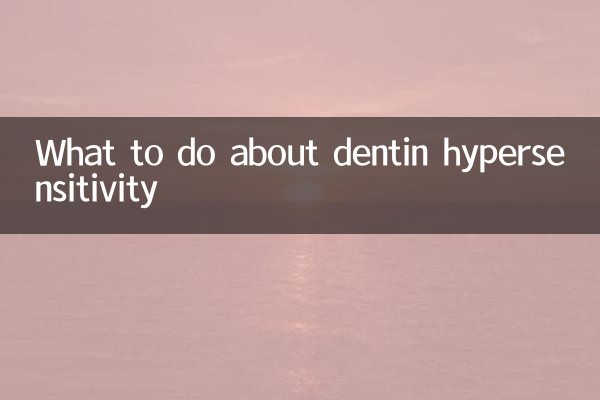What to do if you have dentin hypersensitivity? Full analysis of hot topics and solutions across the Internet in 10 days
Dentin hypersensitivity has become one of the hot topics on social media and health forums recently. Many netizens shared their troubles and experiences in fighting tooth sensitivity. This article will combine the hot discussions across the Internet in the past 10 days to provide you with structured data analysis and practical solutions.
1. Recent hot discussion data on dentin hypersensitivity

| Topic keywords | Discuss the popularity index | main focus |
|---|---|---|
| Causes of dentin hypersensitivity | 85 | Gum recession, acidic foods, brushing methods |
| Sensitive Teeth Treatment | 92 | Professional desensitization treatment, home care methods |
| anti sensitive toothpaste | 78 | Comparison of ingredients and effects of use |
| natural relief | 65 | Salt water mouthwash, green tea application |
2. Analysis of the main causes of dentin hypersensitivity
According to recent popular science content from professional doctors on social platforms, dentin hypersensitivity is mainly caused by the following reasons:
1.Gum recession: Gums recede with age or improper brushing, exposing the tooth root surface.
2.Enamel wear: Brushing too hard, using a hard-bristled toothbrush, or grinding your teeth causes the protective layer to become thinner.
3.acidic diet: The recent popular lemon water diet and increased intake of carbonated drinks have accelerated the tooth demineralization process.
4.dental treatment effects: Temporary sensitivity after dental procedures such as whitening treatment and orthodontic treatment.
3. Top 5 solutions that received the most attention within 10 days
| Ranking | solution | Recommendation index | Applicability |
|---|---|---|---|
| 1 | Professional desensitization treatment | 95% | Severely sensitive |
| 2 | Anti-sensitive toothpaste (contains potassium salt) | 88% | daily care |
| 3 | Soft bristle toothbrush + Pasteur brushing method | 85% | basic prevention |
| 4 | Avoid immediate alternation of hot and cold | 80% | behavioral adjustment |
| 5 | Fluoride mouthwash | 75% | assisted care |
4. Complete response plan recommended by professional doctors
1.Diagnosis first: It is recommended to go to a dental clinic to confirm the cause of sensitivity and rule out other problems such as tooth decay, cracks and so on.
2.hierarchical processing: Mild sensitivity can use anti-sensitivity toothpaste for 4-8 weeks; moderate sensitivity requires professional fluoride application; severe sensitivity may require resin sealing or laser treatment.
3.Daily care points:- Use 37℃ warm water to brush your teeth - Brush your teeth 30 minutes after a meal - Avoid brushing your teeth horizontally - Control the intake of acidic foods
4.emerging therapies: The bio-glass filling and nano-hydroxyapatite technologies recently launched by some dental clinics have received a lot of praise on social platforms.
5. Effective home care methods tested by netizens
Organized based on recent popular sharing posts:
-Green tea bag wet compress: Contains tannic acid that can temporarily seal dental tubules (once a day, 3 minutes each time)
-Coconut oil mouthwash: Get up early and gargle for 15 minutes on an empty stomach to reduce bacterial erosion (needs to persist for more than 2 weeks)
-Aloe vera gel application: Apply directly to sensitive areas to reduce inflammation and calm (for emergency use when sensitivity attacks)
It should be noted that although these methods have been recommended by many netizens, they have not yet been clinically verified on a large scale and are recommended as auxiliary means.
6. Wrong methods to be wary of
Some recently circulated folk remedies may cause harm:
| Wrong approach | Potential risks | correct alternative |
|---|---|---|
| Lemon juice for tooth brushing and whitening | Accelerates enamel corrosion | Professional cold light whitening |
| Rub salt directly on your teeth | Increased mechanical wear | Gargle with light salt water |
| Long-term use of baking soda | Change oral pH | Special whitening toothpaste |
7. Prevention is better than cure: the latest dental care recommendations
Combined with the recently released "Oral Health White Paper", to prevent dentin hypersensitivity, you should do the following:
1. Professional teeth cleaning 1-2 times a year
2. Select sensitive mode when using an electric toothbrush
3. Avoid direct contact with cold air with your teeth in winter
4. Supplement calcium and vitamin D to enhance tooth resistance
5. Treat teeth grinding problems and use bite pads if necessary
Although tooth sensitivity is common, it cannot be ignored. Taking corrective measures in time can prevent the problem from getting worse. It is recommended to choose a suitable plan based on your own situation and stick to it for more than 3 months to observe the effect.

check the details

check the details